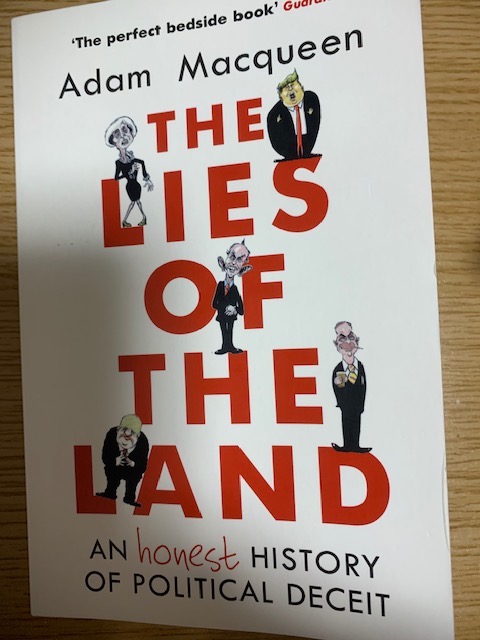 ‘The Lies of the Land’ by Adam Macqueen (Atlantic
Books, 2018) is a play on the words in the expression ‘The Lie of
the Land’, which means how a situation is developing. Written by a
long-time contributor to the UK satirical magazine ‘Private Eye’,
it looks at how politicians have often been “economical with the
truth.” Most famously used by the Cabinet Secretary, Sir Robert
Armstrong, in 1986, it is an indirect reference to ‘lying’.
‘The Lies of the Land’ by Adam Macqueen (Atlantic
Books, 2018) is a play on the words in the expression ‘The Lie of
the Land’, which means how a situation is developing. Written by a
long-time contributor to the UK satirical magazine ‘Private Eye’,
it looks at how politicians have often been “economical with the
truth.” Most famously used by the Cabinet Secretary, Sir Robert
Armstrong, in 1986, it is an indirect reference to ‘lying’.
However, the writer of this book does not actually refer to that
instance. Rather, he looks at many other examples over the period
from the Second World War onwards. These are mostly in the U.K.,
but there are also some examples from the U.S., including the
famous Watergate episode in 1972. In that case, as the writer
indicates, “The weirdest thing about Watergate was how unnecessary
it all was. President Nixon’s approval ratings were on the up in
1972: they peaked for the year, at 62%, just a fortnight before
the burglary of the Democratic National Committee headquarters. He
would go on to win his second election that November by a
landslide.” (p.107) Needless to say, the most recent
incumbent of the White House, Donald Trump, is not left out by the
writer!
Examples from the U.K. particularly centre on some key but
contrasting, events, including the Suez Crisis in 1956. That led
to the resignation of then prime minister, Sir Anthony Eden, who
the author describes a continuing, “to lie through his teeth about
his foreknowledge of the invasion,” as when he said in parliament
on 20th December 1956 that he would, “say it quite bluntly to the
House, that there was not foreknowledge that Israel would attack
Egypt - there was not.” (p.27/32). Another example in the Middle
East concerned intervention in Iraq based on the claimed presence
of WMDs (weapons of mass destruction). Although the author
describes Tony Blair, who was then prime minister, as one of “our
best prime ministers”, along with Winston Churchill and Margaret
Thatcher, he indicates a resulting effect, that “Self-belief can
convince you that everyone else should believe you too. Then
things like empirical truth are for the little people.” (p.5) For
Blair, “Emotional truth counted for far more than historical
truth.” (p.223-224)
With this edition being published in 2018, the latest issue
leading to being “economical with the truth”, is Brexit, Britain’s
withdrawal from the European Union. It particularly focusses on
the ‘leavers’’ campaign which had the infamous promise to, “send
the EU 350 million pounds a week, let’s fund our NHS (National
Health Service) instead,” which appeared on the side of a campaign
bus. This figure was much challenged. As the writer indicates,
“But whichever way you looked at the sums, we sent the EU nothing
like that much money.”
Obviously, it is relatively easy to criticize, but much more
challenging to offer ways to overcome the perception that
politicians are always lying. He offers a few ideas, including a
ban on political donations, which would potentially to reduce lies
related to lobbying. However, he also notes new challenges, not
least the downside of the Internet and the rise of ‘truthiness’,
coined by U.S. satirist, Stephen Colbert, in 2005. This means that
people increasingly people believe in what, “people want to
believe.” That is undoubtedly going to be a major challenge to
deal with.
See the previous book which I wrote about.
 ‘The Lies of the Land’ by Adam Macqueen (Atlantic
Books, 2018) is a play on the words in the expression ‘The Lie of
the Land’, which means how a situation is developing. Written by a
long-time contributor to the UK satirical magazine ‘Private Eye’,
it looks at how politicians have often been “economical with the
truth.” Most famously used by the Cabinet Secretary, Sir Robert
Armstrong, in 1986, it is an indirect reference to ‘lying’.
‘The Lies of the Land’ by Adam Macqueen (Atlantic
Books, 2018) is a play on the words in the expression ‘The Lie of
the Land’, which means how a situation is developing. Written by a
long-time contributor to the UK satirical magazine ‘Private Eye’,
it looks at how politicians have often been “economical with the
truth.” Most famously used by the Cabinet Secretary, Sir Robert
Armstrong, in 1986, it is an indirect reference to ‘lying’.